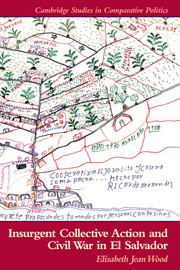Book contents
- Frontmatter
- Contents
- List of Illustrations and Tables
- Preface and Acknowledgments
- List of Abbreviations
- 1 THE PUZZLE OF INSURGENT COLLECTIVE ACTION
- 2 ETHNOGRAPHIC RESEARCH IN THE SHADOW OF CIVIL WAR
- 3 REDRAWING THE BOUNDARIES OF CLASS AND CITIZENSHIP
- 4 FROM POLITICAL MOBILIZATION TO ARMED INSURGENCY
- 5 THE POLITICAL FOUNDATIONS OF DUAL SOVEREIGNTY
- 6 THE REEMERGENCE OF CIVIL SOCIETY
- 7 CAMPESINO ACCOUNTS OF INSURGENT PARTICIPATION
- 8 EXPLAINING INSURGENT COLLECTIVE ACTION
- Epilogue: Legacies of an Agrarian Insurgency
- Appendix: A Model of High-Risk Collective Action by Subordinate Social Actors
- Chronology of El Salvador's Civil War
- References
- Index
- Other Books in the Series
7 - CAMPESINO ACCOUNTS OF INSURGENT PARTICIPATION
Published online by Cambridge University Press: 05 June 2012
- Frontmatter
- Contents
- List of Illustrations and Tables
- Preface and Acknowledgments
- List of Abbreviations
- 1 THE PUZZLE OF INSURGENT COLLECTIVE ACTION
- 2 ETHNOGRAPHIC RESEARCH IN THE SHADOW OF CIVIL WAR
- 3 REDRAWING THE BOUNDARIES OF CLASS AND CITIZENSHIP
- 4 FROM POLITICAL MOBILIZATION TO ARMED INSURGENCY
- 5 THE POLITICAL FOUNDATIONS OF DUAL SOVEREIGNTY
- 6 THE REEMERGENCE OF CIVIL SOCIETY
- 7 CAMPESINO ACCOUNTS OF INSURGENT PARTICIPATION
- 8 EXPLAINING INSURGENT COLLECTIVE ACTION
- Epilogue: Legacies of an Agrarian Insurgency
- Appendix: A Model of High-Risk Collective Action by Subordinate Social Actors
- Chronology of El Salvador's Civil War
- References
- Index
- Other Books in the Series
Summary
What our history has been! We have come to know what a movement is, we have won a cease-fire. We, as a cooperative, now we know what it is to be free.
Land Defense Committee, Las Marías, 1992Why did campesinos in Tenancingo and Usulután support the FMLN and join insurgent organizations, despite the high costs of doing so? The Salvadoran insurgency was about land. Perhaps access to land, a key material interest of campesinos, accounts for why so many campesinos participated in the insurgency, thereby resolving the puzzle of collective action posed in the opening pages of this book. However, at the time the insurgent cooperatives were formed, residents of the case-study areas had access to land whether or not they participated, as long as they refrained from informing on insurgent activities and made occasional material contributions (which they also had to make to passing government forces). Thus during the middle and later years of the civil war, it was possible for those who did not support the rebels to reside in the case-study areas as “free riders” on the benefits of the insurgency. The benefits included improved working conditions in some areas and unprecedented access to land and freedom from the often capricious authority of landlords and security forces in others. But none of these benefits required participating in the insurgency beyond the coerced minimum contribution. In short, the material benefits of the insurgency took the form of a public good that was available to all residents.
- Type
- Chapter
- Information
- Insurgent Collective Action and Civil War in El Salvador , pp. 193 - 225Publisher: Cambridge University PressPrint publication year: 2003



